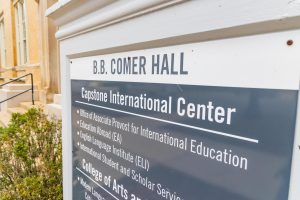Faculty Senate issues 10 recommendations to improve campus culture
February 24, 2022
The Faculty Senate is setting out to change campus culture through a series of one- and five-year plans it has been drafting since 2019, when then-Dean of Students Jamie Riley resigned.
Riley resigned after tweets in which he criticized the American flag and made a connection between police and racism resurfaced in a Breitbart News article. In the aftermath of his departure, the Faculty Senate created a task force to address campus culture.
“The Faculty Senate was moved to [create the task force] because Senators felt the nature of the resignation, and the lack of transparency from the University regarding the details perpetuated a reputation of the University being non-inclusive and discriminatory,” said Russel Peterson, a research and instructional services librarian and task force member.
After two years of small-group discussions, interactive forums on campus with students, and two surveys, the task force has 10 recommendations for campus administration.
These recommendations include implementing diversity, equity and inclusion training; placing placards in front of campus buildings; introducing a required course on racism at the University; creating a creed to guide faculty and staff; increasing accessibility on campus; hiring human resources representatives; hiring more administrative staff; increasing staff salaries; and making the task force permanent.
One of the task force’s one-year goals is to make diversity, equity and inclusion training mandatory for administration and search committees to teach members what diversity means outside of race. This goal also serves to correct the disproportionate pressure placed on minority faculty members to serve on search committees.
The task force is calling for placards in front of renamed buildings, citing the importance of students and staff knowing why the building name was changed, as well as the history behind it.
One of the five-year goals calls for a mandatory course for first-year students about the University’s efforts to correct its racist past or a requirement that freshmen take the Hallowed Grounds Tour. The tour is a product of associate professor Hilary Green’s research on the history of slavery at the University.
“Distrust of the administration was based on the perception that we only seem to want to highlight wins and success and continually fail to acknowledge historical and current Shortcomings,” said Leah Cheatham, a task force member and assistant professor in the School of Social Work. “To be constructive in creating a welcoming campus, we made recommendations for transforming our history and struggles into teaching opportunities for every member of our community and on multiple fronts.”
Conversations during small-group interviews revealed that a significant number of white faculty and staff members perceive diversity, equity and inclusion measures as threatening their positions instead of strengthening the University.
The task force proposed an equivalent to the Capstone Creed, which is a statement of principles to guide UA students. The faculty and staff creed would highlight how diversity benefits everyone and would be drafted and proposed within the next five years.
Buildings and campus grounds, the task force proposes, should be more accessible for those with physical disabilities beyond federal accessibility minimums.
“Several respondents to our surveys mentioned how UA’s infrastructure … older buildings, flooded sidewalks, lack of central parking … impeded folks with physical disabilities from navigating campus,” Peterson said.
The task force requested mandatory HR training for all chairs, deans and members of the administration. Faculty often serve as HR for the staff under them, which caused concern for the Faculty Senate about impartiality. Over the next five years, HR representatives would be hired for every department to decrease fear of retaliation.
Additionally, the task force called for an increase in administrative staff in order to correct the lack of response and transparency surrounding Title IX and Equal Employee Opportunity Commission complaints over the next five years.
“In some cases, the reporting process doesn’t account for instances where there might not be an illegal violation. Yet, there was still harm to a person and finding some way to strike [a] balance and attend more to ensure that everybody feels included,” Cheatham said.
To make the University inclusive and cement its place as an academically rigorous institution that attracts and retains its employees, the task force recommends an annual survey on the state of the campus, as well as competitive compensation for staff before 2027.
Correction on Feb. 25: The Faculty Senate recommendation called for increased staff salaries.
Questions? Email the news desk at newsdesk@thecrimsonwhite.com.




















